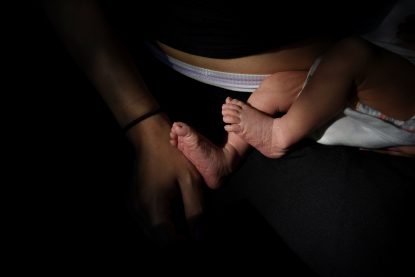
A mother in Forth Worth, Texas, breastfeeds her newborn son April 10, 2020, during the coronavirus pandemic. (CNS photo/Callaghan O’Hare, Reuters)
WASHINGTON (CNS) — Amid heated discussion surrounding the new abortion law in Texas, which bans abortions from six weeks, Catholic bishops have emphasized the importance of a long-running state program to help pregnant women.
“Texas has invested hundreds of millions of dollars in programs for pregnant moms and families,” said a statement issued by the Texas Catholic Conference, two days after the new law went into effect.
The conference, which is the public policy arm of the state’s Catholic bishops, was referring to the state-funded program Alternatives to Abortion, which started in 2005. The program provides funds for pregnancy centers that offer counseling services and resources to women in crisis pregnancies.
“Hundreds of pregnancy and parenting support programs and adoption services in our state provide practical resources to women and families facing overwhelming circumstances,” the group’s Sept. 3 statement said.
[hotblock]
The Texas Catholic Conference noted that “pregnant and parenting moms in need are in our parishes and our neighborhoods. As Pope Francis reminds us, our parishes must be ‘islands of mercy in the midst of a sea of indifference.'”
The state’s bishops also stressed that “everyone in the parish should know where to refer a pregnant woman in need.” They said this work is also something that has been taken up on the national level with the initiative of the U.S. Conference of Catholic Bishops, Walking with Moms in Need, which helps pregnant women and mothers.
In a Sept. 9 statement, Archbishop Joseph F. Naumann of Kansas City, Kansas, chairman of the USCCB’s Committee on Pro-Life Activities, said that he wished to “echo the words of the Texas Catholic bishops who expressed gratitude for the growing network of support for pregnant mothers and their families in Texas.”
The archbishop noted that the Texas legislature recently increased support for low-income mothers by 25% in its Alternatives to Abortion program and by expanding Medicaid coverage for new mothers.
In addressing the new Texas abortion law, he said it “seeks to use civil rather than criminal law to protect the lives of vulnerable children in the womb.”
On Sept. 9, the Justice Department sued the state of Texas for the new abortion ban, calling the state law unconstitutional. It is also seeking an injunction to prohibit the law’s enforcement.
Archbishop Naumann called it tragic that political leaders, including President Joe Biden and Speaker of the House Nancy Pelosi, “have responded with statements that ignore our nation’s sacred interest to protect the life and health of both mothers and their unborn children, instead responding with radical pledges to mobilize the full force of the federal government to block all efforts to protect the life of the child in the womb.”
[tower]
San Francisco Archbishop Salvatore J. Cordileone similarly criticized these leaders and also highlighted state support for pregnancy centers in Texas in a Sept. 5 op-ed piece in The Washington Post where he said: “Texas gets this right.”
“The state is investing $100 million to help mothers by funding pregnancy centers, adoption agencies and maternity homes and providing free services including counseling, parenting help, diapers, formula and job training to mothers who want to keep their babies,” he said.
The archbishop primarily emphasized the importance of Catholics speaking out against abortion and urged Catholics to particularly challenge Catholic politicians who support laws favoring abortion.
“You cannot be a good Catholic and support expanding a government-approved right to kill innocent human beings,” he said.
Currently, there are 22 abortion clinics in Texas and more than 200 pregnancy centers.
Pregnancy centers provide free diapers, formula, clothing, toys, books, car seats, furniture as well as pregnancy tests, adoption referrals and nutrition and counseling resources.
One pregnancy center, Flourishing Tree Family & Pregnancy Resource Center in Aledo, Texas, is part of an outreach of the Diocese of Fort Worth.
Terri Schauf, the Respect Life coordinator for the diocese, said: “Pregnancy centers are really at the forefront of pro-life ministry, helping women directly in need when they have a crisis pregnancy or an unexpected pregnancy.”
In an article last year in the North Texas Catholic, the online newsmagazine of the Diocese of Fort Worth, Schauf said it is crucial to have pregnancy centers around the diocese because clients often don’t have the resources to travel far from home.
[hotblock2]
She also said the diocese’s Respect Life office is “putting our actions where the church’s teachings are. We respect life from the moment of conception to natural death.”
The issue of when does life begin comes up with the new Texas abortion law that had been called the “heartbeat bill” when it moved through the state legislature for banning abortions when a fetal heartbeat could be detected at about six weeks.
The Texas Catholic Conference said the law’s opponents have called the heartbeat terminology misleading, saying that what is heard is “embryonic cardiac activity” or “electrically induced flickering of embryonic tissue.”
“These attempts to dehumanize the unborn are disturbing,” the state’s bishops said.
Similarly, Cardinal Timothy M. Dolan of New York raised this point on a Sept. 7 episode of “Conversation with Cardinal Dolan” on SiriusXM’s Catholic Channel.
Speaking about the Texas abortion law, which the Justice Department is expected to challenge in court, the cardinal asked: “When does life begin?”
He added that if the line is drawn at different stages in fetal development, then it’s not really “a question of life; it’s a question of convenience. It’s a question of choice.”
“Choice is not an absolute value; life is,” he added.
PREVIOUS: U.S. bishops launch initiative on polarization in society
NEXT: After 9/11, how else could war money have been spent?


Share this story